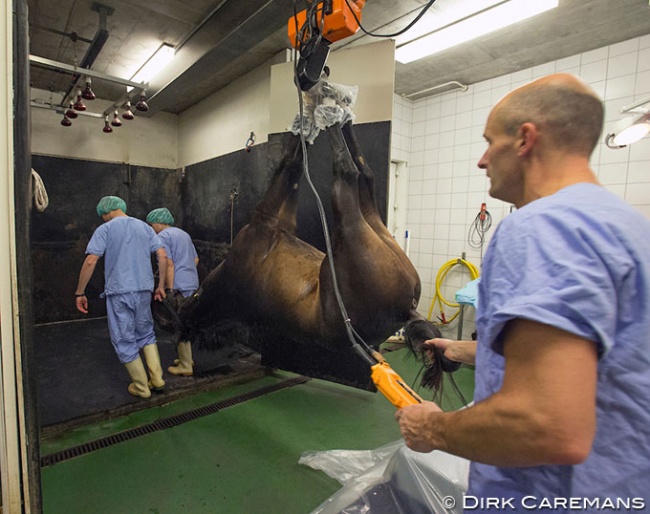
- by Erika Sherman and Glenye Cain Oakford - USEF press release
Veterinary professionals are at greater risk for mental health problems because of the stressful and demanding nature of their work. One mental health survey that the Centers for Disease Control and Prevention conducted in the veterinary profession found that nearly one in 10 veterinarians reported serious psychological distress, a higher proportion than among adults in the general population.
Increased Risk for Depression and Suicide
A CDC study published in 2019 in the Journal of the American Veterinary Medical Association reviewed veterinarians’ causes of death from 1979 through 2015 and found that “female veterinarians were 3.5 times as likely, and male veterinarians were 2.1 times as likely, to die from suicide as the general population.”
“Veterinarians in the U.S. are at an increased risk of suicide, a trend that has spanned more than three decades,” the CDC reported.
Erika Sherman, a DVM candidate in the class of 2025 at the Cummings School of Veterinary Medicine at Tufts University, recently interviewed veterinarian and equestrian Dr. Richard Mitchell of Fairfield Equine Associates in Newtown, Conn., about a range of topics while interning at the EQUUS Foundation.
In recognition of Mental Health Awareness Month, USEF has excerpted his comments about mental wellbeing from Sherman’s larger Q & A interview, which will appear later this year in Equestrian Weekly.
Suicide and mental health issues are growing problems within the field of veterinary medicine. One in six veterinary professionals considers suicide, which is three times the U.S. national average. Why do you think this is?
I think dealing with loss and [the fact] that clients blame you are big factors. Some people can’t get past seeing themselves as letting society down, letting an animal down, and letting the client down. When I look back at my career, I do recall a few situations where I know I have probably made a mistake, but I also look back upon the vast majority of my career and say that I did the best I could. You have to look at yourself in the mirror and say, “I did the best I could with what I had." That's the philosophy that's kept me going.
We care, it weighs heavily on us, but we have to let it go. Preparing yourself to do the best you can with what you've got, what you know, believing in yourself, and letting go is how you make yourself resilient.
I also think euthanasia is a major factor. As veterinarians, we have an obligation to minimize suffering and discomfort, and to honor our professional commitments to not only our animals but also to our clients. Above all else, do no harm. The veterinarian may know that more could be done, but they acquiesce to the client's wishes and put the animal to sleep. Well, if you put an animal to sleep, what are you doing? Doing harm? Or are you putting the animal out of his/her misery? The ability to play God is a real slippery slope and a fine line that weighs heavily on veterinarians.
What can we do to address mental health for veterinary professionals?
I think burnout is at the root of the issues impacting mental health—people not knowing when to go home … not knowing when to turn the switch off for a little while. I think we can, as a group, support one another and have interactive sessions with other veterinarians. We have to encourage each other to turn the switch off, even if it's just for a few hours every day.
I've seen, in my own practice, some of my colleagues that just can’t go home, they can’t let go, and they suffer for it. Young veterinarians have a tough time doing that, because they're so overwhelmed with trying to learn their trade.
I think that we need to teach people how to separate their personal life from their professional life. There's no such thing as a 50-50 balance—especially as a physician—but what you have to do is make the most of your free time. You have to take time to laugh, to have a good dinner, a nice bottle of wine, turn your phone off, maintain your hobbies, take a weekend off and go somewhere. I go home, I put my feet up, have a glass of wine, I watch television, have dinner, and I talk to my wife.
You just have to leave it at the office. In the years that I was the very busiest, I was also riding competitively. My wife will tell you I was a nervous wreck and a pain a lot of the time, but yet when I got on that horse it was a great diversion and an escape. I think that is really important.
Reach Out
The American Association of Equine Practitioners offers wellness resources, including emotional and social wellness, for equine veterinarians. Not One More Vet is a nonprofit organization committed to raising awareness and providing support, education, and tools for veterinarians to combat mental health issues in their field.
The National Suicide Prevention Lifeline provides 24/7, free, confidential support for people in distress, prevention and crisis resources for you or your loved ones, and best practices for professionals.
Photo © Dirk Caremans
Related Links
Adriane Alvord: "The Pain that Lives Behind the Barn Door"
Angelia Bean: "The Horse Business is Tough, But Those Words Don't Even Touch the Surface"
Natasha Dvoryava: "How to Fix the Dressage Trainer Blues"
Spanish Riding School Bereiter Harald Bauer Died Unexpectedly